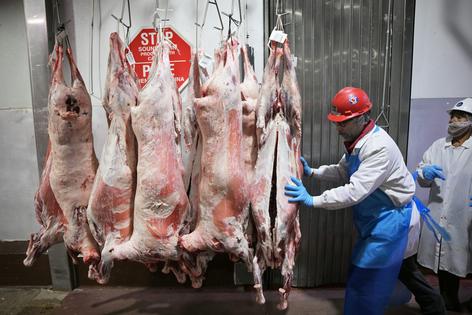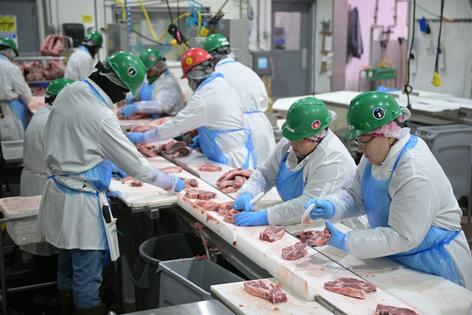Denver slaughterhouse ban could affect food systems in Colorado and beyond
Published in Political News
Ballot measure 309 aims to ban slaughterhouses in the city and county of Denver. If passed, the measure would close just one facility, Superior Farms, in the Globeville neighborhood north of Denver.
I’m an associate professor of animal sciences at Colorado State University. My research explores solutions for meat and food system challenges such as food safety, market resiliency and sustainability. I’m part of a research team that examined the potential effects of ballot measure 309 on the local, state, national and global meat supply chain.
The Superior Farms lamb processing facility employs approximately 160 people and represents 15% to 20% of the total lamb slaughter capacity in the U.S. Our study reports that the sheep harvested at the Denver facility are primarily from Colorado and the Mountain West region.
Colorado has rugged rangeland that is well suited for sheep ranching. It is currently the third-largest sheep-producing state in the nation, after Texas and California.
Colorado houses another large lamb-processing facility in the Northeastern plains and 21 substantially smaller facilities around the state.
The ability of these processors to market meat to consumers is far less than that of Superior Farms, due to capacity or inspection limitations. Our report found that the closure of the Denver facility would require most of the sheep harvested there to instead be harvested in other states.
More likely though, sheep producers who historically sent their lambs to Denver for harvest will instead not be able, or willing, to ship them to other states due to increased costs and concerns for animal welfare effects. As a result, many sheep producers would have to make difficult decisions about their future, with some ultimately determining lamb production is no longer viable.
Our study suggested a potential 2% impact on the livestock production industry nationwide as a result of the proposed ban and closure of Superior Farms.
The effects, which have been observed after closures of meat-processing facilities in other regions, include fewer sheep produced and a decline in the economic value of live sheep. They also involve a loss of livestock employment opportunities and a transition away from sheep production toward other enterprises.
It’s not just the size of Superior Farms that makes it important to the supply chain, it is also its ability to access consumers in a variety of markets that is crucial for the sheep industry.
Only 33 of Colorado’s 120 meat-processing operations are inspected by the U.S. Department of Agriculture Food Safety and Inspection Service. The remaining facilities are considered exempt from federal inspection and are instead regulated by the state of Colorado.
These two designations control the ability of sheep producers and meat processors to get their products to consumers.
The Federal Meat Inspection Act was passed in 1906 to help ensure the safety and quality of meat products intended for human consumption. It also establishes standards for the well-being of animals at the time of harvest. The legislation has led to widespread improvements in the meat industry, including the creation of the Food Safety and Inspection Service in the mid-1980s.
Today, the Food Safety and Inspection Service is the federal authority responsible for implementing inspection and labeling standards in meat processing. This is done largely through continuous onsite inspection by trained inspectors and a robust approval and record-keeping structure.
The Food Safety and Inspection Service offers exemptions from federal inspection for smaller meat processors, but the exempted meat products are not eligible for resale – meaning these products can’t be purchased at the local grocery store, farmer’s market or downtown restaurant. Instead, they are intended to be consumed by the owner of the animal.
While this exemption is amenable for a producer with five or 10 sheep, it is untenable for a producer with hundreds or thousands of sheep. For that producer, access to federally inspected meat-processing facilities, such as Superior Farms, and the market access afforded by those facilities is the linchpin to profitability, sustainability and supply chain integrity.
If the Superior Farms facility were to close, Americans will have a challenging time finding Colorado lamb at their local grocery store or on the menu at their favorite restaurant.
This is true even in cities on the East and West coasts.
The number of sheep producers in the U.S. has declined steadily over the past four decades due to consumption trends, rising production costs and challenging environmental conditions such as drought. As supplies of sheep and lamb decrease, U.S. restaurants and retailers have had to look elsewhere to meet their customers’ low, but relatively stable, demand for lamb products.
On the other side of the globe, Australia and New Zealand have found markets for their lamb among U.S. consumers. Their competitive ability to produce lamb has made them a desirable trade partner for the U.S. – and a majority of lamb consumed in the U.S. is imported from these two countries. Our study suggests a further reduction in lamb production in the U.S. will increase U.S. reliance on imported lamb from Australia and New Zealand.
The meat industry is global – and the success of the U.S. meat industry is interwoven in relationships with other meat-eating countries.
In the case of lamb, the organ meats and other less frequently consumed lamb products produced at the Denver Superior Farms facility are often exported to countries such as Mexico, Canada and the Caribbean.
Maintenance of these trade relationships is a delicate balance with significant financial repercussions.
This export market increases the average value of U.S. sheep and is crucial for the profitability of sheep ranchers. A reduction in exports to other countries, and a decline in profitability for U.S. ranchers, will likely increase imports of lamb from Australia and New Zealand to meet U.S. demand.
Balancing the value of the export market with imports from other countries underpins the profitability of livestock and meat producers across the globe.
Though Americans often think of the food system and meat supply chain in the context of their local markets, it is a global industry with exquisitely complex and interwoven relationships. Changes in one part of the supply chain can and do have tangible, and in some cases irrevocable, effects on other supply chain components.
Denver voters won’t be making a decision only about their city and local food supply chain. Their decision will affect the national and global lamb industry.
This article is republished from The Conversation, a nonprofit, independent news organization bringing you facts and trustworthy analysis to help you make sense of our complex world. It was written by: Jennifer Martin, Colorado State University
Read more:
Trump’s Detroit insults are based on old narratives local media are rewriting every day
Colorado’s Amendment 80 wants to make school choice ‘a right’ when it already is – an expert in educational policy explains the disconnect
Climate change matters to more and more people – and could be a deciding factor in the 2024 election
Jennifer Martin does not work for, consult, own shares in or receive funding from any company or organization that would benefit from this article, and has disclosed no relevant affiliations beyond their academic appointment.
































































Comments